News & Updates
Obstetric fistula stories and announcements
Obstetric fistula stories and announcements
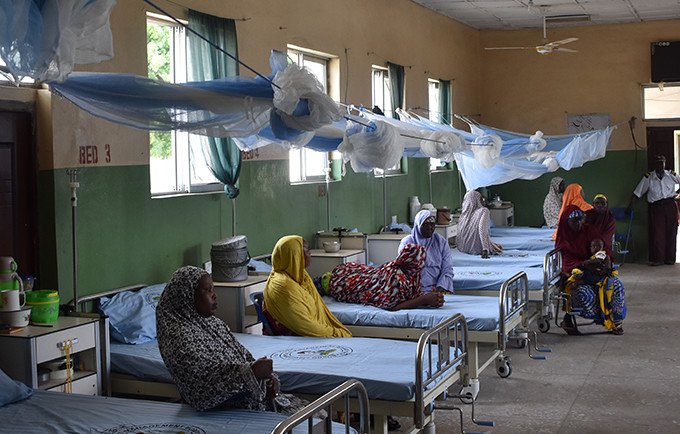
MAIDUGURI, Nigeria – “One week after I delivered my second child, I realized that there was an issue,” Aisha told UNFPA from her hospital bed in Maiduguri, in north-east Nigeria. She had developed an obstetric fistula, a devastating childbirth injury that can derail a woman’s whole life.
Read MoreMAIDUGURI, Nigeria – “One week after I delivered my second child, I realized that there was an issue,” Aisha told UNFPA from her hospital bed in Maiduguri, in north-east Nigeria. She had developed an obstetric fistula, a devastating childbirth injury that can derail a woman’s whole life.
Obstetric fistula occurs during prolonged, obstructed labour. The obstruction can create a hole between the vaginal wall and the bladder or rectum, leading to incontinence – and often stigma, shame or even rejection from families and communities.
“I am now worried to mix with people,” Aisha said. “I am so disturbed by this. I love my husband but he is so disturbed too.”
Obstetric fistula is a major public health problem in Nigeria.
According to a 2010 report by EngenderHealth, an estimated 400,000 Nigerian women and girls suffer from fistula, and approximately 12,000 new cases occur annually.

This injury afflicts society’s poorest and most marginalized – those without access to emergency obstetric medicine.
The humanitarian crisis in the north-east has exacerbated these conditions; a significant majority of the country’s fistula cases take place in the north.
Aisha was 12 years old when she got married, and 14 by the time she delivered her second child.
Her situation is not uncommon.
Women and girls in the region face high rates of child marriage and early pregnancy, which is part of the problem. Pregnant adolescents have a higher risk of experiencing fistula because their bodies may not be ready for motherhood.
“Early childbirth, a lack of skilled birth attendants, unavailability of comprehensive emergency obstetric care services and poor access to family planning are the main factors contributing to obstetric fistula,” said Dr. Diene Keita, UNFPA’s Representative in Nigeria. “All of these factors are very prominent in the north-east.”
Fistula is preventable – with speedy access to medical care such as Caesarean section – and it is treatable with surgery.
“Opportunities for fistula repair surgery exist in North-East Nigeria,” Dr. Keita said. “However, due to the ongoing conflict, health facilities in rural areas have been destroyed or damaged, and the referral system to operating hospitals and the outreach programme, to make women aware of the surgery, are broken.”
A fistula surgery costs roughly $300 to $420, which puts it beyond the reach of most of those afflicted.
And because the condition only affects vulnerable women and girls, and is not considered life-threatening, it is often not prioritized.
Every year, UNFPA’s Campaign to End Fistula supports approximately 1,200 fistula repair surgeries in Nigeria.
“We see that the surgery is very important,” said Asabe Christopher Mshelia, a nurse-midwife in the fistula unit of Maiduguri State Specialist Hospital, where UNFPA is supporting upgrades. “Not only for the individual woman but also as a pull factor for other women and girls to seek help. If a woman goes back to her community after a successful surgery, the good news travels and inspires others to come forward.”
UNFPA is also working to improve access to emergency obstetric care in emergency settings. And the government has also adopted policies to help prevent and eliminate this injury.
But much more remains to be done.
Today, Aisha is on the waitlist for a repair surgery at the Maiduguri State Specialist Hospital. Despite her troubles, she is confident about the future.
“I want to go back to my husband and have more children after the surgery,” she told UNFPA. “But I might advise my younger sisters to wait with marriage and children because I learned here that being a young mother can cause this issue of fistula.”
– Anne Wittenberg
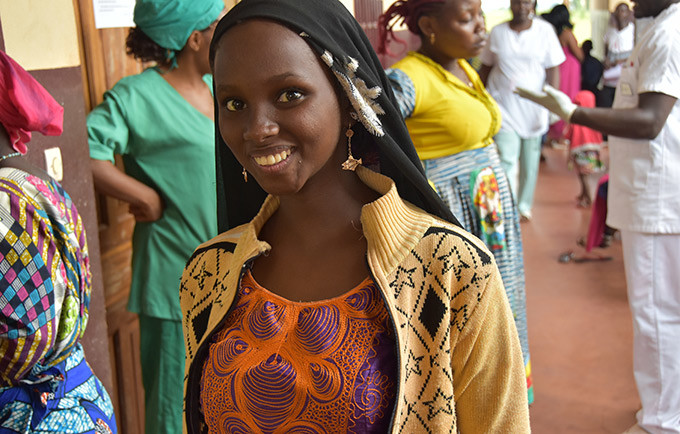
Batouri, Cameroon – Amina was married when she was just a child. Soon after, she became pregnant, and, at only 13 years old, she went into labour. As is the case with many girls her age, Amina’s body was not mature enough to bear a child, and she suffered an obstructed labour, an excruciating condition that could have killed her.
Read MoreBatouri, Cameroon – Amina was married when she was just a child. Soon after, she became pregnant, and, at only 13 years old, she went into labour. As is the case with many girls her age, Amina’s body was not mature enough to bear a child, and she suffered an obstructed labour, an excruciating condition that could have killed her.
Fortunately, both she and her baby survived the childbirth, but the ordeal left Amina with a devastating injury known as an obstetric fistula, a hole in the birth canal that leaves women incontinent and vulnerable to a raft of medical problems.
This condition afflicts the world’s most vulnerable women and girls, and it makes their lives immeasurably harder: Many are abandoned by their families and ostracized by their communities.
More than 20,000 women are estimated to be living with obstetric fistula in Cameroon, and some 2,000 new cases occur every year. Yet it is almost entirely preventable. In fact, it has been essentially eliminated in industrialized countries through the availability of emergency obstetric care.

A 10-day campaign held in early July – a collaboration between UNFPA, the United Nations Population Fund, the health ministry, the Orange Foundation – reached out to survivors with free repair surgeries, training for health workers, and information to help community members make sure fistula does not happen in the first place.
Free fistula surgeries
Amina, now 20, was one of 33 women to receive free fistula repair surgeries during the campaign, which brought four Cameroonian specialists to Batouri, in the eastern part of the country. The doctors conducted three to four operations per day, followed by post-operation observation lasting 14-21 days.
It was a rare opportunity for women in the East Region, who otherwise would have to travel up to 700 kilometres through rough terrain to reach the N’gaoundéré fistula repair centre, which was established by UNFPA and the MTN Foundation in 2013.
But many more women must be reached, experts acknowledge.
“It would be illusory to think that the current rate of repairs can reduce the pool of women with fistula who are waiting for surgery,” said Barbara Sow, UNFPA’s Representative in Cameroon.
For greater impact, UNFPA and its partners are working to increase the number of health centres able to deliver care to fistula survivors.
This is why the doctors participating in the 10-day campaign also trained health workers at the Catholic Hospital of Batouri, including three physicians, two anaesthesiologists and 10 nurses.
Now that they have a qualified team in the region, women will no longer need to travel to N’gaoundéré for care.
Beyond surgery
But fistula survivors also have needs beyond surgery. Because of their exclusion by the community, most women have been forced to abandon their jobs and livelihoods. "When I had fistula, people wouldn't buy the food I was selling because of the bad odour of urine and the leaking," recalled one woman who received the repair surgery.
UNFPA and Orange will provide 60 fistula survivors with seed funding for small businesses and other income-generating activities.

And UNFPA is working to spread the word in communities that fistula can be prevented from happening in the first place, by ensuring women give birth under the care of a skilled birth attendant – such as a midwife, nurse or doctor – who can respond should complications arise.
It is especially important to get these messages to men, “since they hold decision-making power over their wives,” said Dr. Sow.
UNFPA-trained advocates are speaking about the issue in so-called husband’s clubs, groups of men who meet regularly to discuss family matters. And the message seems to be having an effect, experts say.
“Prevention is better than the cure,” Dr. Sow said.
– Olive Bonga
The story was first published on UNFPA website.
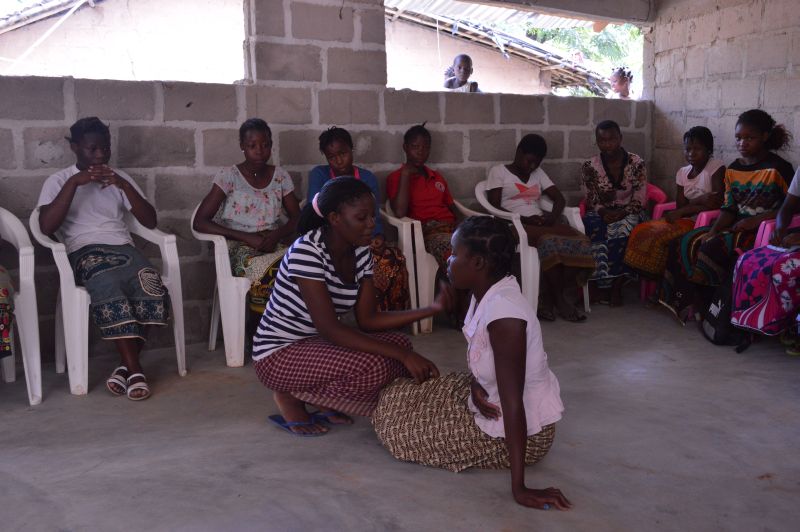
“In my community, it is difficult not to see adolescent girls aged 15 to 16 years pregnant or as young mothers”, says 18-year-old Lucia Aiuba Amade from Quelimane in Mozambique's province Zambezia.
Childbirth at an early age is associated with greater health risks for the young mother. In fact, complications of pregnancy and childbirth are the leading cause of death in young women aged 15 to 19 years.
Read More“In my community, it is difficult not to see adolescent girls aged 15 to 16 years pregnant or as young mothers”, says 18-year-old Lucia Aiuba Amade from Quelimane in Mozambique's province Zambezia.
Childbirth at an early age is associated with greater health risks for the young mother. In fact, complications of pregnancy and childbirth are the leading cause of death in young women aged 15 to 19 years.
Teenage pregnancy often force girls to drop out of school, and expose them to the risk to develop a fistula.
Lucia is one of 783 mentors trained under “Rapariga Biz” - the first joint United Nations programme on sexual and reproductive health and rights for teenage girls in Mozambique led by the government with technical assistance by UNFPA, the United Nations Population Fund, UN's educational and scientific organization UNESCO, UN's children's agency UNICEF and UN's women's agency UN-WOMEN, funded by the Swedish International Development Assistance (SIDA).
In Mozambique, an estimated 2,300 new cases of fistula occur every year. This is largely due to the high rates of teenage pregnancy and early marriage. According to a survey by the Ministry of Health, 46 per cent of girls between 15 and 19 years are pregnant or mothers and 48 per cent of girls are married before 18 years.
Rapariga Biz aims to reach 1 million girls and young women of 10-24 years from 2016 to 2020 to address the pressing sexual and reproductive situation of girls and young women in the provinces of Nampula and Zambezia.
Mentors prevent fistula
“Our communities lack information about fistula, and the girls and young women are the ones to bear the consequences. Those living with fistula are isolated and discriminated against. We can help prevent this child birth complication under Rapariga Biz,” says Lucia Aiuba Amade.
Each mentor is leading a session with some 30 girls between 10-14 years or 15-19 years each week for six months in a safe space in the community identified by the girls and young women themselves.
In the first year, Rapariga Biz has reached a total of 23,518 women and girls.

In the safe space, they learn and discuss about life skills, solidarity, human rights, including the right to live free of violence and child marriage, sexual reproductive health, the consequences of early pregnancy and how to prevent it.
Fistula has a dedicated session: “We need to ensure that the girls and young women understand the causes and consequences of fistula to empower them to make informed choices and delay the first pregnancy,” says 22-year-old Amina Carlos Antonio.
Promoting the rights of teenage girls
“The key to eliminate fistula is prevention, specifically through prevention of child marriage and teenage pregnancy which sits at the heart of our efforts as UNFPA targeting the most vulnerable girls and young women. It is essentially about their rights to health and life,” says Bettina Maas, UNFPA Representative in Mozambique.
The ability to control the own fertility is fundamental to the empowerment and equality of women and girls. Apart from the preventive efforts, UNFPA is supporting Mozambique's Government in ensuring the availability of treatment and social reintegration for fistula survivors.
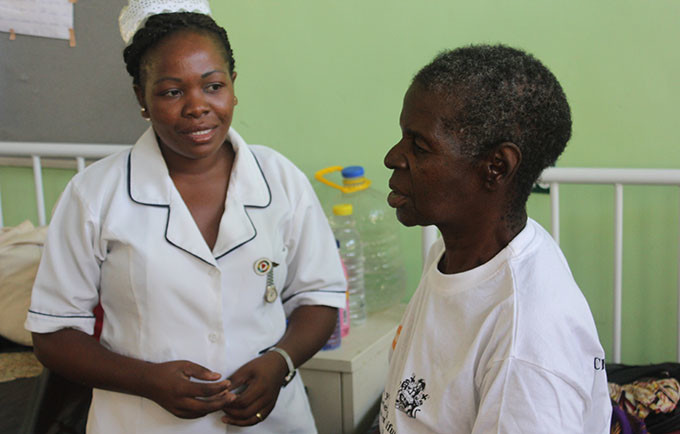
Mangochi District, Malawi – A phone call changed Nachilango Bisolomo’s life.
For 46 years, she had suffered from an obstetric fistula, a stigmatizing injury caused by childbirth complications. Fistula causes incontinence and can also lead to infections, chronic pain and other problems.
“Everywhere I sat, I left a mark, and people would come to see, and talk so much about my condition. I was helpless and could not do anything about this,” she told UNFPA.
Read MoreMangochi District, Malawi – A phone call changed Nachilango Bisolomo’s life.
For 46 years, she had suffered from an obstetric fistula, a stigmatizing injury caused by childbirth complications. Fistula causes incontinence and can also lead to infections, chronic pain and other problems.
“Everywhere I sat, I left a mark, and people would come to see, and talk so much about my condition. I was helpless and could not do anything about this,” she told UNFPA.
Like many fistula survivors, she felt embarrassed and alienated. “My life has been hell,” she said.
But then one day, Ms. Bisolomo’s son-in-law was at the Monkey-bay Community Hospital in Mangochi District, and he saw a ward full of women wrapped in 'chitenje', a fabric worn around the waist.
The women explained that they were fistula survivors. The hospital was holding an obstetric fistula "camp," and repairing fistulas free of charge.
He immediately phoned his mother-in-law.
Ms. Bisolomo quickly travelled the 300 km from Dedza District, and the next day, she underwent the surgery.
When she was wheeled out of the operating room, her niece, Anastanzia Paulo, cried tears of joy.
Ms. Bisolomo's long ordeal was coming to an end.
“One who has been punished”
Ms. Bisolomo was born Nasiwelo Bisolomo. She married early, and was pregnant by 18.
She had no idea that adolescent pregnancy increases one’s risks. Childbearing before the pelvis is fully developed can lead to prolonged and obstructed labour, the complication that causes an obstetric fistula.

At the time, Ms. Bisolomo lived over 100 km from the nearest hospital, so she gave birth at home. The labour was horrendous and long, and, tragically, her baby died in the process. Afterward, she was left with a fistula.
The loss was devastating – as was life with her condition.
She even changed her name to Nachilango, meaning “one who has been punished.”
“I accepted that I will be like this for the rest of my life,” she said.
Still, in some ways, Ms. Bisolomo was fortunate.
Many women with fistula are abandoned by their families and persecuted by their community. But Ms. Bisolomo’s family life was just beginning.
She and her husband managed to successfully have another baby, Natumani, who is now 45 years old. Her husband stayed with her until he died in 2012.
Then Ms. Bisolomo learned about the fistula camp, an initiative supported by UNFPA and organized by Mangochi District Hospital.
Forty-one women received care at the camp. Some were referred elsewhere for more specialized operations; over half were repaired and discharged.
“It took us almost three hours in the theatre to have her repaired,” Gonjezo Kumpatsa, one of the medical clinicians, said about Ms. Bisolomo. “It was a complicated condition, coupled with her age, but we are hopeful she will be healed.”
Treatment and prevention
Surviors like Ms. Bisolomo are now helping to spread the word that fistula treatment is available.
“We are able to mobilize more patients through the treated patients, who act as our ambassadors,” said Lydia Kasiya, a nurse and midwife technician.
Ms. Bisolomo plans to keep her name to send a message to other women.

“I don’t intend to change my name when I go back, despite being healed,” she said from her hospital bed, “because I want to still be an example to many that this condition can be cured.”
Since 2011, UNFPA, the Freedom From Fistula Foundation and AMREF Health Africa have supported the government in providing fistula treatment in Lilongwe and Mangochi.
Last year, fistula camps were held in Chikwawa, Mulanje and Mangochi districts, including at the Bwaila fistula centre.
But fistula repair services are not enough.
The condition is easily prevented through access to emergency obstetric care – usually in the form of a Caesarean section. In fact, the condition is so preventable that it has been essentially eliminated in industrialized countries.
UNFPA supports midwifery trainings, health centres and reproductive health supplies to bolster the availability of emergency obstetric care in remote areas around the world.
Meanwhile, Ms. Bisolomo’s family is determined to convince more women to seek proper health care.
“I am sure people will ask who this amazing traditional healer is,” said Ms. Paulo, “but I will tell them it’s the hospital, and it is a condition that can be cured.”
– Henry Chimbali
The story was first published on UNFPA website.

Abra sits quietly as she remembers the journey of her life. For 24 years, she has known suffering and great emotional pain. One day and one event changed the course of her life for over two decades.
Read MoreAbra sits quietly as she remembers the journey of her life. For 24 years, she has known suffering and great emotional pain. One day and one event changed the course of her life for over two decades.
On that day, many years ago, Abra went into labor. It was her fifth child, and she had managed all of her previous labors by herself at home. But this time was different. After struggling with the pain and pressure, she was taken to the hospital for a caesarian section. “There was no hope,” Abra remembers sadly. “Even the doctor lost hope.” The struggle was devastating. The baby died, and Abra remained in a coma for five days.

Abra dances her way into the hospital’s Dress Ceremony.
When she awoke, she learned that her husband had decided to leave her. Then, a few days later, she realized she was incontinent. The condition that Abra suffered from is known as VVF (vesicovaginal fistula). It is an injury caused by obstructed labor, and it results in a continual leakage of urine, feces, or both. Unfortunately, it is a condition that is much too common in developing countries, where women have little access to medical care.
The condition exacts a terrible emotional toll, as well. Abra was ostracized by her family, friends, and community. “Everybody in our area knows about my sickness,” Abra says quietly with downcast eyes. “All of them know.”
Over the years, people often mistreated Abra. They made signs and yelled insults at her. When she stood up, they often checked her clothes to see if they were wet. For a few years, she was able to stay with some relatives. However, when they died, she was on her own in the bush, secluded from the world. She was isolated from every kind of help and support – physical, mental, and emotional.
Abra says she only got through this time with God’s help. “In those times of challenges and pain, I did weep most of the time. I didn’t have anybody to come to my rescue. I spent most of my time in my hidden place, where I wept.” She struggled with depression that made it difficult for her to eat, and she longed for the day her suffering would come to an end. “So the only option is to wait for God’s time when I will join him after death, and it will be the end of everything. This was all I could tell myself before the ship came,” she says sadly.
Then, in 2010, Mercy Ships sailed into the port of Lomé, Togo. The arrival of the hospital ship brought hope for Abra – something she had not felt for a long time. Soon she was received a free successful surgery. After spending a few weeks in the ship’s hospital, Abra was able to go home.
She felt like a new woman, but her joy was short-lived. Tragically, a few weeks later, Abra was the victim of a brutal rape that ruined the surgical repair. She was back in the same nightmare she had experienced for two decades. “When my sickness came back, I was confused and lost,” Abra explains. Sadly, the ship had already left, and she had nowhere to turn.
Abra took refuge with her brother, who required her to be the housekeeper for the entire family. The work was very difficult for her. When she was unable to complete all the tasks, she was driven out of the home. She was only allowed to re-enter the house at certain hours to sleep. She had to awake every morning at 4:00 to leave the house and had to wait until late in the evening to return. She was not allowed to use the kitchen or even take a cup to drink from. She could not share in any of the food. Her brother’s family wanted to make sure she suffered because they were uncomfortable with her sickness.

No one can take Abra’s smile away. She is filled with joy.
Abra struggles to hold back tears as she recalls those days. “My brother did not agree with me. According to him, I’m telling a lie – I am not sick because I didn’t lose weight.” She quietly says a prayer and pauses before continuing, “My brother mistreated me. He mistreated me to the point that I got seriously sick.” The pain of her brother’s rebukes and abuse almost destroyed Abra’s spirit.
Finally, she found reprieve with her aunt. “She told me I smelled like a dead corpse before joining her. But the hands of God are upon me. Today I am here. I am still alive today,” she says.
Less than a year later, Abra’s daughter contacted her, telling her the wonderful news that Mercy Ships had returned! “For me, Mercy Ships has been sent from God to me, and I know that the ship is here to heal, I was hopeful. I didn’t know other people, too, have this sickness, I thought I was alone. But now, I know that I’m not the only one. I’m confident, and God is with me.”
Now, Abra has healed from her second surgery with Mercy Ships. She is living with her daughter and has been accepted back into the family. “I feel better now. No, rather, great! And I thank the Lord for the life of the medical team. May the Lord bless them, strengthen them, and give them long life. They will be blessed. God will reward them for ever and ever.”
Abra’s face radiates with happiness as she adds simply, “I have joy in me!”
Written by Nicole Pribbernow. Edited by Nancy Predaina. Photos by Debra Bell. Courtesy: Mercy Ships.

Abra sits quietly as she remembers the journey of her life. For 24 years, she has known suffering and great emotional pain. One day and one event changed the course of her life for over two decades.
Read MoreAbra sits quietly as she remembers the journey of her life. For 24 years, she has known suffering and great emotional pain. One day and one event changed the course of her life for over two decades.
On that day, many years ago, Abra went into labor. It was her fifth child, and she had managed all of her previous labors by herself at home. But this time was different. After struggling with the pain and pressure, she was taken to the hospital for a caesarian section. “There was no hope,” Abra remembers sadly. “Even the doctor lost hope.” The struggle was devastating. The baby died, and Abra remained in a coma for five days.

Abra dances her way into the hospital’s Dress Ceremony.
When she awoke, she learned that her husband had decided to leave her. Then, a few days later, she realized she was incontinent. The condition that Abra suffered from is known as VVF (vesicovaginal fistula). It is an injury caused by obstructed labor, and it results in a continual leakage of urine, feces, or both. Unfortunately, it is a condition that is much too common in developing countries, where women have little access to medical care.
The condition exacts a terrible emotional toll, as well. Abra was ostracized by her family, friends, and community. “Everybody in our area knows about my sickness,” Abra says quietly with downcast eyes. “All of them know.”
Over the years, people often mistreated Abra. They made signs and yelled insults at her. When she stood up, they often checked her clothes to see if they were wet. For a few years, she was able to stay with some relatives. However, when they died, she was on her own in the bush, secluded from the world. She was isolated from every kind of help and support – physical, mental, and emotional.
Abra says she only got through this time with God’s help. “In those times of challenges and pain, I did weep most of the time. I didn’t have anybody to come to my rescue. I spent most of my time in my hidden place, where I wept.” She struggled with depression that made it difficult for her to eat, and she longed for the day her suffering would come to an end. “So the only option is to wait for God’s time when I will join him after death, and it will be the end of everything. This was all I could tell myself before the ship came,” she says sadly.
Then, in 2010, Mercy Ships sailed into the port of Lomé, Togo. The arrival of the hospital ship brought hope for Abra – something she had not felt for a long time. Soon she was received a free successful surgery. After spending a few weeks in the ship’s hospital, Abra was able to go home.
She felt like a new woman, but her joy was short-lived. Tragically, a few weeks later, Abra was the victim of a brutal rape that ruined the surgical repair. She was back in the same nightmare she had experienced for two decades. “When my sickness came back, I was confused and lost,” Abra explains. Sadly, the ship had already left, and she had nowhere to turn.
Abra took refuge with her brother, who required her to be the housekeeper for the entire family. The work was very difficult for her. When she was unable to complete all the tasks, she was driven out of the home. She was only allowed to re-enter the house at certain hours to sleep. She had to awake every morning at 4:00 to leave the house and had to wait until late in the evening to return. She was not allowed to use the kitchen or even take a cup to drink from. She could not share in any of the food. Her brother’s family wanted to make sure she suffered because they were uncomfortable with her sickness.

No one can take Abra’s smile away. She is filled with joy.
Abra struggles to hold back tears as she recalls those days. “My brother did not agree with me. According to him, I’m telling a lie – I am not sick because I didn’t lose weight.” She quietly says a prayer and pauses before continuing, “My brother mistreated me. He mistreated me to the point that I got seriously sick.” The pain of her brother’s rebukes and abuse almost destroyed Abra’s spirit.
Finally, she found reprieve with her aunt. “She told me I smelled like a dead corpse before joining her. But the hands of God are upon me. Today I am here. I am still alive today,” she says.
Less than a year later, Abra’s daughter contacted her, telling her the wonderful news that Mercy Ships had returned! “For me, Mercy Ships has been sent from God to me, and I know that the ship is here to heal, I was hopeful. I didn’t know other people, too, have this sickness, I thought I was alone. But now, I know that I’m not the only one. I’m confident, and God is with me.”
Now, Abra has healed from her second surgery with Mercy Ships. She is living with her daughter and has been accepted back into the family. “I feel better now. No, rather, great! And I thank the Lord for the life of the medical team. May the Lord bless them, strengthen them, and give them long life. They will be blessed. God will reward them for ever and ever.”
Abra’s face radiates with happiness as she adds simply, “I have joy in me!”
Written by Nicole Pribbernow. Edited by Nancy Predaina. Photos by Debra Bell. Courtesy: Mercy Ships.
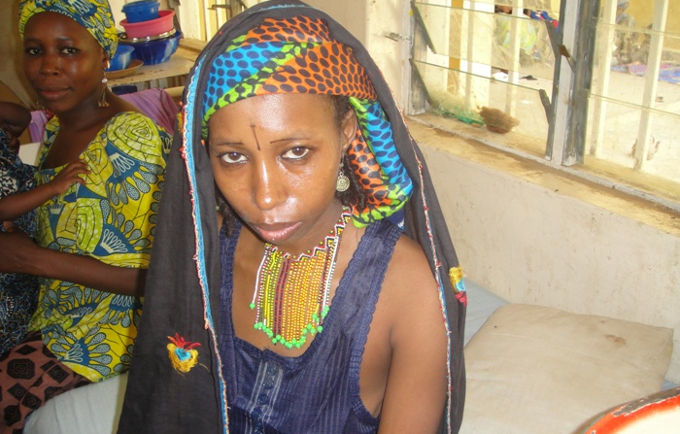
Kano State, Nigeria - I met Zainab Baubau, a 32-year-old fistula survivor, 19 years after the death of her son, an infant she lost during childbirth and developed an obstetric fistula.
Read MoreKano State, Nigeria - I met Zainab Baubau, a 32-year-old fistula survivor, 19 years after the death of her son, an infant she lost during childbirth and developed an obstetric fistula.
At the age of 12, she was in labour for 48 hours, and while she waited eagerly to hear the cry of her baby, instead she heard herself crying for help. “I had prolonged obstructed labour, struggled with eclampsia, was unconscious for two weeks at the hospital and only survived to hear the sad news of my still birth and this illness.” She went on to say she felt alone because the life she knew was no longer hers.
Fistula is a condition that affects at least two millions of women worldwide, but most prevalent in developing countries. It is a childbirth complication caused by obstructed labour. It occurs when the tissues between the woman’s vagina and her pubic bone are damaged by continuous pressure from the infant’s neck trapped in the birth canal. The damaged tissue later falls off resulting in a hole through which the woman continuously leaks urine or faeces or both.
In Nigeria, an estimated 400,000 to 800,000 women are currently living with fistula and approximately 20,000 new cases occur each year. As part of the global Campaign to End Fistula, UNFPA in 2005 launched the “Fistula Fortnight” in Nigeria. It was a ground-breaking initiative that was aimed at expanding treatment options for the women and girls suffering from the condition. The initiative also supported the implementation of facility and community-based interventions to facilitate prevention of fistula and mobilize indigent women and girls to access free treatment and rehabilitation.
UNFPA has registered remarkable success in the focus areas of its fistula programming in Nigeria. It has supported free surgical repairs for Zainab and more than 6,000 women and girls living with fistula by 2016, achieving an average of 97 per cent successful repair rates to date. A total of 52 doctors and 94 nurses were trained to repair both simple and complex fistulae. In addition, comprehensive surgical equipment, including fistula repair kits, were procured and supplied to nine General Hospitals and three National Obstetric Fistula Centers throughout the country to support routine provision of fistula repair surgery. A total of more than 460 community educators and mobilizers – both women and men – were trained to provide counseling services to women living with fistula and their spouses. In addition, 40 social workers were trained to support women by providing necessary pre-and post-operative psychosocial counselling services to clients in the treatment and rehabilitation centres.
Hauwal Mohammed, a 35-year-old fistula survivor, also took part in UNFPA vocational skills acquisition and empowerment programme. At age 16, she was forced to drop out of school to marry a suitor. She lived with the condition for ten years after several failed attempt of surgical repair. She felt unworthy because everything she touched was considered dirt. “If I touch a plate they will discard it. I cried a lot,” she said. After the successful surgery, Hauwal was empowered to become economically independent and is now a proud tailor running her business. Hauwal is not the only one.
UNFPA has supported the economic rehabilitation of more than 350 successfully operated fistula survivors in addition to the social reintegration of more than 400 survivors with fistula deemed inoperable, through skills acquisition training sessions and provision of start-up kits.
Fistula is preventable, and can be avoided by delaying the age of first pregnancy; ensuring skilled birth attendance at all births and providing timely access to obstetric care for all women who develop complications during delivery. UNFPA will not stop until fistula is history in Nigeria.
- Lolade Johnson
The story was fist published on UNFPA Nigeria website.
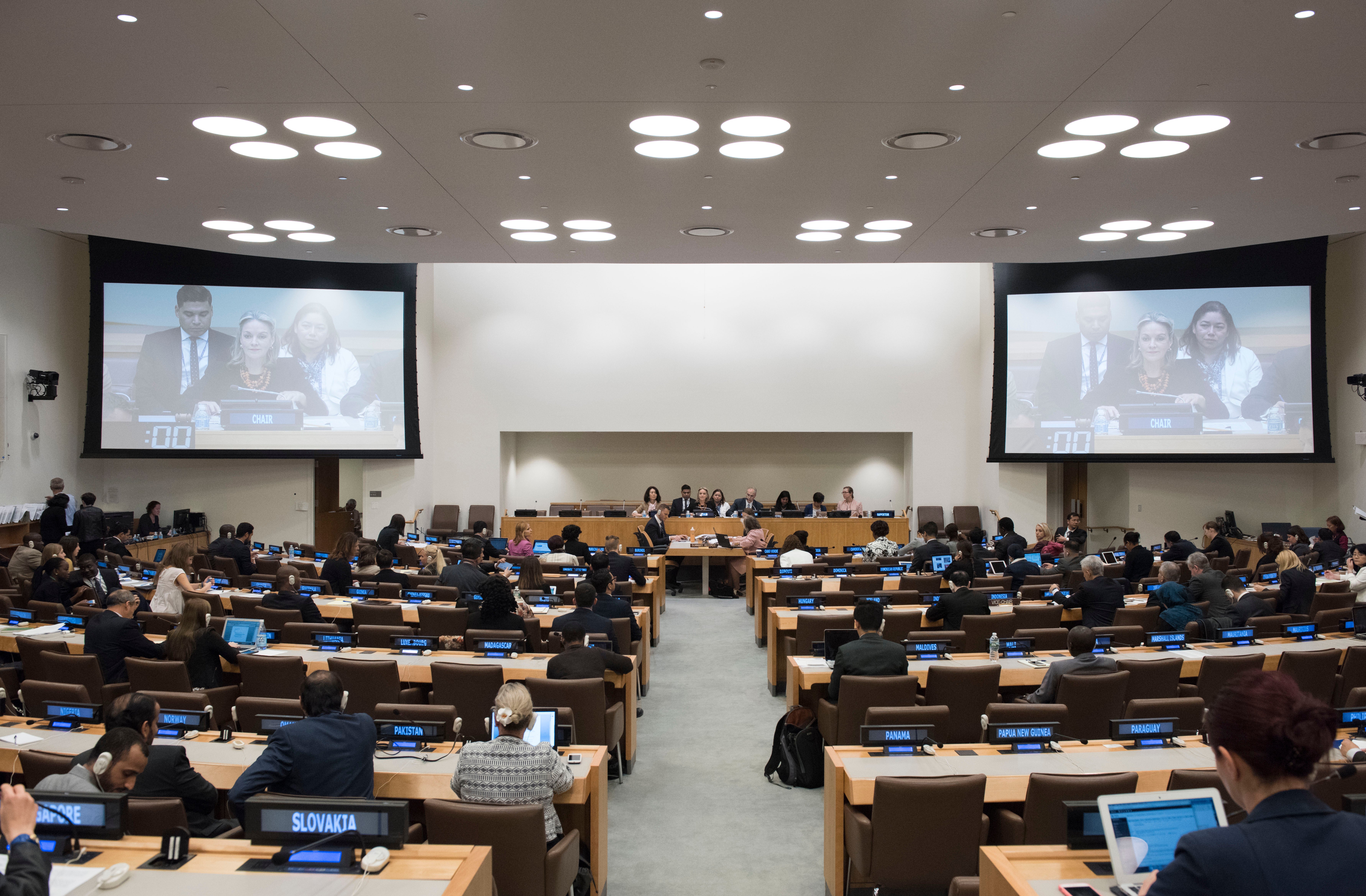
United Nations, New York – The Committee on Social, Humanitarian and Cultural Issues of the United Nations General Assembly adopted a UNFPA-backed resolution today that calls upon the international community to end fistula within a generation.
Learn moreUnited Nations, New York – The Committee on Social, Humanitarian and Cultural Issues of the United Nations General Assembly adopted a UNFPA-backed resolution today that calls upon the international community to end fistula within a generation.
The resolution, co-sponsored by more than 130 countries, calls on States to take all measures to ensure the rights of women and girls to the highest standard of mental and physical health, including reproductive health and rights. While recognizing that poverty, lack of maternal health services, early childbearing and early marriage are interlinked as root causes of fistula, the resolution notes that poverty and inequality remain the main social barriers to eradicating fistula.
In its resolution, the Committee urges the international community to redouble efforts to improve maternal health. This includes universal access to skilled birth attendance, high-quality emergency care and family planning, along with appropriate care before and after birth.
The resolution highlights the need to make greater investments in the health sector to ensure skilled health workers, especially midwives, to provide life-saving care. It urges multilateral donors and financial institutions to ensure that more resources reach young women and girls, in particular in rural and remote areas and the poorest urban areas.
The resolution also calls upon the international community to support the activities of UNFPA, the United Nations Population Fund, and its partners in the global Campaign to End Fistula in establishing and financing fistula treatment and training centres.
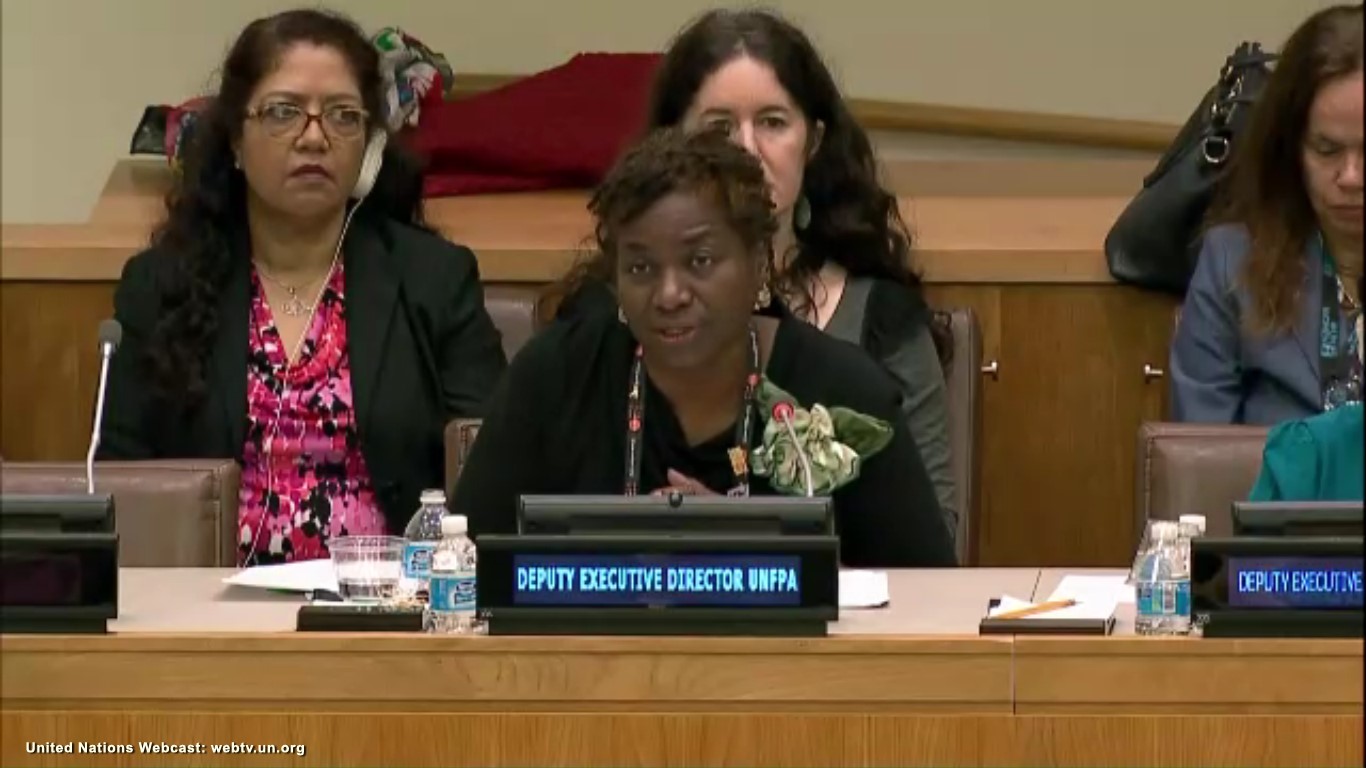
United Nations, New York - Dr. Natalia Kanem, Deputy Executive Director (Programme) of UNFPA, the United Nations Population Fund, presented the United Nations Secretary-General’s report "Intensifying efforts to end obstetric fistula" to the Social, Humanitarian Cultural Affairs Committee (Third Committee) of the General Assembly in New York today.
Read MoreUnited Nations, New York - Dr. Natalia Kanem, Deputy Executive Director (Programme) of UNFPA, the United Nations Population Fund, presented the United Nations Secretary-General’s report "Intensifying efforts to end obstetric fistula" to the Social, Humanitarian Cultural Affairs Committee (Third Committee) of the General Assembly in New York today.
Dr. Kanem noted that progress has been made in the past two years by integrating fistula into national health strategies, plans and policies. By the end of 2015, according to the report, at least 15 countries had developed national strategies for ending fistula, which is more than a quarter of all countries in which the UNFPA-led Campaign to End Fistula is active.
Harnessing the power of partnerships, efforts to end fistula have been integrated into many effective health initiatives focusing on maternal and newborn health. Dr. Kanem underscored the example of the Global Midwifery Programme, in which UNFPA partners with the International Confederation of Midwives, USAID, the African Medical Research Foundation (AMREF) Health Africa and others, to support countries strengthen their midwifery programmes and policies. Such a partnership is critical, noted Dr. Kanem, considering the vital role midwives play in saving the lives of mothers and babies and preventing severe maternal and newborn illnesses.
While the achievements made were commendable, Dr. Kanem added, it was necessary to galvanize collective action at the global level to accelerate progress. A point strongly emphasized in the Secretary-General's report is that fistula is almost entirely preventable when there is universal access to quality sexual and reproductive health care.
“Therefore, the persistence of obstetric fistula reflects not only severe health inequities and health system failures or socio-economic, gender, and cultural barriers facing women and girls, but it is a human rights violation,” Dr. Kanem said.
In order to tackle the underlying drivers of fistula and end this terrible scourge, it is necessary to eradicate poverty, reduce socio-economic and gender inequality, protect women’s and girls’ human rights, ensure universal access to health services and to education, and prevent child marriage and teenage pregnancy.
The report made a number of recommendations, Dr. Kanem said, including significantly accelerating efforts and developing a global action plan to end fistula within a generation. The report also calls for increased financial and human resources, such as skilled surgeons to repair fistula, and scaling-up three well-known and cost-effective interventions: skilled birth attendance; emergency obstetric and newborn care; and family planning.
“The world we want is a world where obstetric fistula no longer exists,” Dr. Kanem said. “If we commit to this ‘fistula-free world’ and to protecting the human rights, well-being, and dignity of each woman and girl everywhere, we can make every pregnancy and childbirth safe, eliminate the abomination of obstetric fistula and prevent this tragedy all around the world, once and forever.”

Chonyi, Kenya - At the bloom of her youth, 50 years ago, Jumwa Kabibu Kai, a resident of Kidutani, a small village in Chonyi, Kilifi County, Kenya, was psychologically prepared for the birth of her second child.
Read MoreChonyi, Kenya - At the bloom of her youth, 50 years ago, Jumwa Kabibu Kai, a resident of Kidutani, a small village in Chonyi, Kilifi County, Kenya, was psychologically prepared for the birth of her second child.
As she went into labour, Jumwa was all alone in her small hut crying her heart out but no-one was in sight. This is because her nearest neighbour lived three kilometres away. Kidutani is generally a marginalized area with poor infrastructure, including accessibility to a health facility.
Jumwa found relieve walking around her compound because in her heart she knew her neighbours would finally either hear her or come visiting. This went on for three days when her sister came visiting. Immediately, her sister mobilized a few neighbours who rushed Jumwa to hospital.
Jumwa could not comprehend what her doctor was explaining to her hours after the delivery “but something was definitely wrong”, she recalls. She had lost her baby, too.
“I returned home after a day at the hospital, extremely disturbed by the loss of my child. Then almost immediately I began passing urine uncontrollably,” she narrates. “I didn’t take it very seriously because I thought it was something normal. In any case, there were other women in the village with the same condition,” she adds. This according to her was “the beginning of 50 years of a long nightmare.”
Unknown to Jumwa, she had developed obstetric fistula – a hole between the birth canal and bladder or rectum that is usually caused by prolonged obstructed labour. It is both preventable and treatable, but fistula plagues the lives of thousands of women in Kenya every year, leaving them incontinent for urine or stool or both.
“I knew a bad spell was cast on me,” she states. “How can this be happening to me? I remember the bad smell, the wetness, the shame and worst of all the disappointment I saw in my family. The feeling was all too awful,” she adds.
After a while, and out of desperation, Jumwa began to seek help - any help from traditional healers, local dispensaries and religious groups, but without much success. In 2009, she heard of possible fistula treatment in Coast General Hospital in Mombasa, but she was late therefore she did not get the assistance. This devastated her losing all hope she had.
Signed a new lease of life
“At some point, I convinced myself that my condition didn’t have a cure, and so I had to learn to live with it,” she says. She would later learn through her 28-year-old granddaughter, Mwafungo, that she indeed was suffering from fistula and help was possible. Mwafungo, married and a mother of two, heard about the one-week fistula camp held at the Kilifi County Hospital in May 2016.

The camp organized by UNFPA, the United Nations Population Fund in partnership with the Kilifi County Government, the international non-governmental organizations Flying Doctors Society of Africa and Freedom from Fistula Foundation, the musical group Them Mushrooms, which partnered with the Campaign to End Fistula to raise awareness, and the Kenyan non-profit voluntary women's organization Maendeleo Ya Wanawake gave a once in a lifetime opportunity to women and girls, like Jumwa to receive free fistula repair as well as create awareness in the community about fistula.
“The past 50 years was hell on earth for me,” Jumwa, now aged 77, narrates. “I was completely isolated by family, friends and my whole community due to my condition, with some attributing it to witchcraft. Sadly, my husband too, left after I began suffering. I used to live alone in a hut in the outskirt of the village, with extremely minimal contact with anyone,” she adds.
Fifty years later, Jumwa cannot hide her joy and sparkling smile after the surgery.
“To be honest, I feel like I have signed a new lease of life,” she states. “I feel great. I feel young. I feel beautiful and wanted,” says an excited Jumwa before jokingly adding that now with her groove back, she expects to bump into a hunky single old man like herself and taste love one more time.
“I appeal to all women suffering with this condition to seek medical help. Fistula indeed is treatable,” she poses rather seriously.
During the one one-week fistula camp, 65 women were screened, while 32 patients were admitted and 30 surgeries done. Many of these women had faced discrimination and stigma with some being ostracized from the community they once belonged to.

Strengthening the health system
Kilifi County has one of the highest teenage pregnancy rates, which together with poor access to emergency obstetric and newborn care may lead to increased risk for obstetric fistula. To this end UNFPA is working with other stakeholders including the community leaders and the County Government to encourage girl-child education, prevention of child marriages and gender based violence.
UNFPA has built the capacity of Kilifi County Hospital by procuring maternal health equipment for both basic and comprehensive obstetric care, including equipment for fistula repair. UNFPA has also invested in the training of 35 nurses on emergency care and screening of patients as well as care before, during and after surgery of fistula survivors. This team will also act as mentors for their colleagues in the respective health facilities. Nineteen community health workers were trained in identification of fistula survivors and community sensitization. These community health workers are also acting as key architects in reintegration of the fistula survivors within the community.
The story was published first on UNFPA’s Kenya Country Office website.